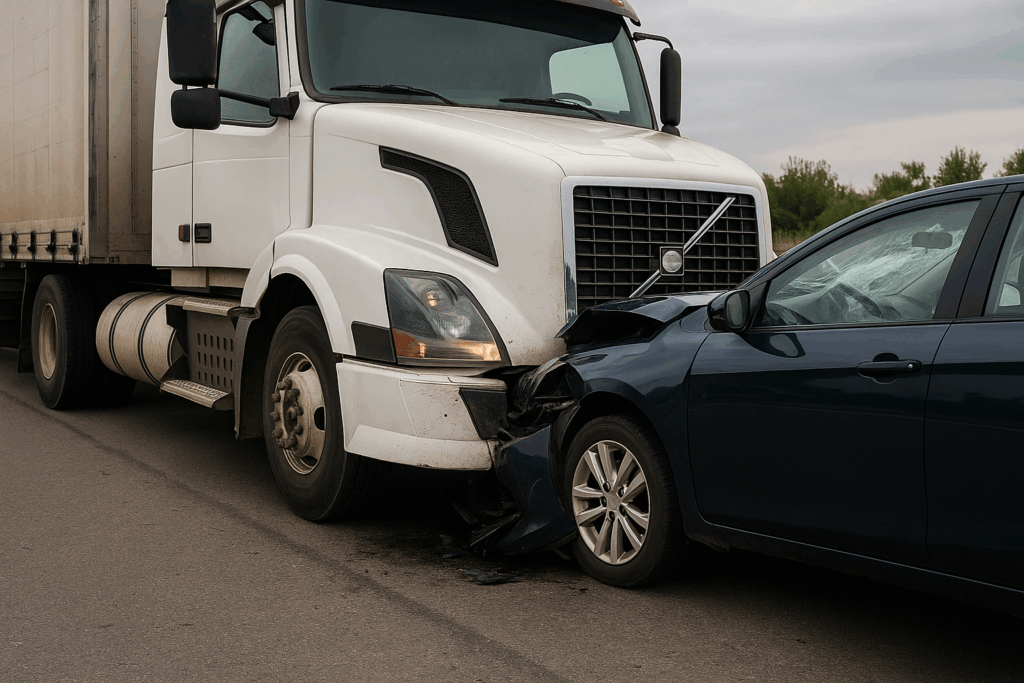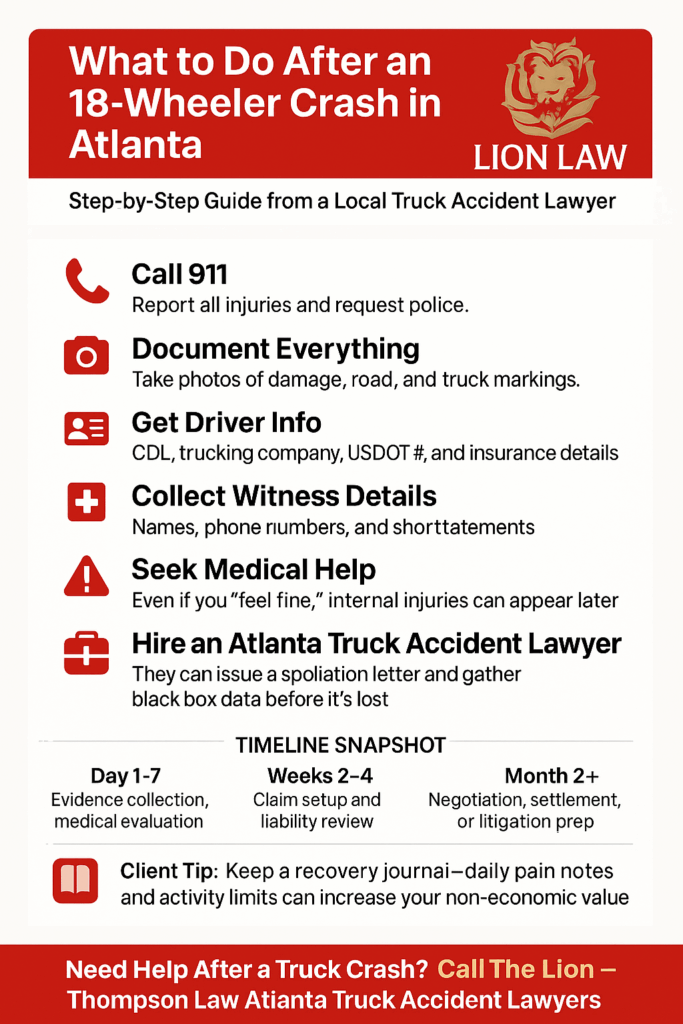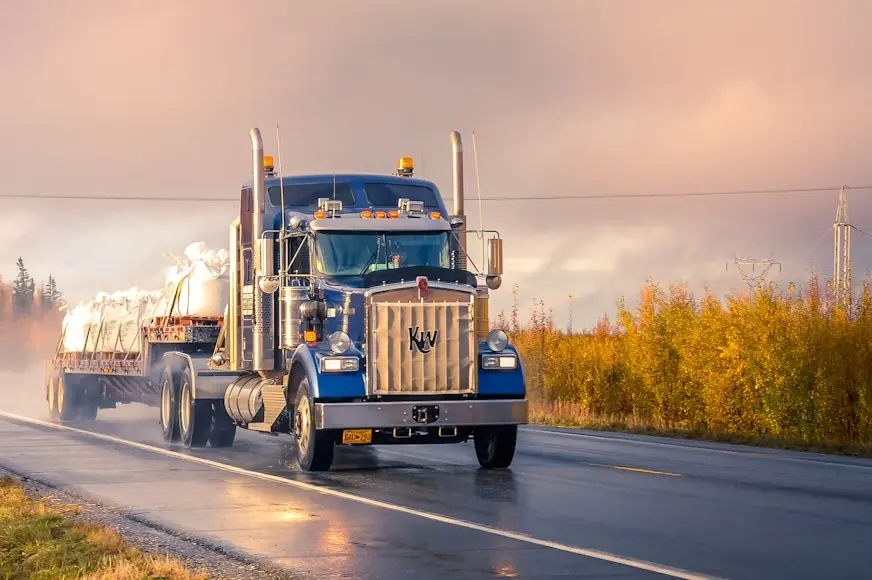Atlanta Truck Accident Lawyer Guide: 18-Wheeler Crash Claims Explained
If you were hit by a semi-truck or 18-wheeler in Atlanta, you’re not just dealing with a “bigger car accident.” You’re facing a life-changing event that can leave you physically hurt, emotionally shaken, and financially uncertain. This guide—written from the perspective of an Atlanta truck accident lawyer—explains what to do right after the crash, how your case is investigated, and how to protect your right to full compensation. It’s designed to help you make informed choices while you focus on recovery.
Featured Snippet
What to do after an 18-wheeler crash in Atlanta:
- Call 911 and report injuries; request police at the scene.
- Document photos, witness info, truck and carrier details.
- Preserve ELD/logbooks, black box, and dashcam evidence.
- Contact an Atlanta truck accident lawyer to evaluate liability, damages, and next steps.

Why 18-Wheeler Crashes Are Different (and More Complex)
Truck accidents are far more complicated than standard car wrecks. Commercial carriers must follow Federal Motor Carrier Safety Administration (FMCSA) regulations covering driver qualifications, hours-of-service, maintenance logs, and cargo securement. When these rules are ignored, the results are often catastrophic. Understanding these differences helps you see why hiring an experienced Atlanta truck accident lawyer is crucial early on.
Because of the sheer size and weight of big rigs, victims often face severe or disabling injuries that require long-term treatment and rehabilitation. Beyond physical pain, many clients describe deep emotional distress, anxiety behind the wheel, and financial pressure from medical bills and lost wages. A good attorney not only builds your claim—but also helps you restore stability after one of the most traumatic events of your life.
- Multiple defendants: the driver, motor carrier, broker or shipper, maintenance vendor, parts manufacturer, or trailer owner may all share fault.
- Critical electronic evidence: ELD/logbooks, ECM (“black box”) data, GPS records, dashcam footage, and inspection reports provide proof of what really happened.
- Higher damages: severe injuries, lifetime care, lost earning potential, and emotional suffering require careful valuation.
What to Do Immediately After a Truck Crash in Atlanta
In the moments after a crash, it’s hard to think clearly. Shock, pain, and confusion set in fast—but your actions now can shape your claim later. Here’s a simple list to follow if you’re physically able:
- Call 911. Ask for police and EMS, and report all injuries—even if they seem minor at first.
- Document the scene. Take wide and close-up photos of vehicle damage, skid marks, traffic signs, and weather conditions.
- Collect driver and truck details. Write down the truck’s license, company name, USDOT number, and insurance information.
- Get witness statements. Ask for names and phone numbers before people leave the scene.
- Seek medical care immediately. Internal injuries and whiplash can take hours or days to show symptoms.
- Notify your insurer. Report the crash promptly but avoid recorded statements until you’ve spoken with legal counsel.
- Contact an Atlanta truck accident lawyer. Early legal help ensures critical evidence is preserved and insurance adjusters don’t take advantage of your situation.
Even if you think the truck driver’s insurer will “handle everything,” remember: their goal is to protect their bottom line, not your recovery. A local attorney can step in quickly to handle communication, gather records, and protect your rights so you can focus on healing.

How an Atlanta Truck Accident Lawyer Builds Your Case
A truck crash case isn’t won by guesswork—it’s built with methodical investigation and strong evidence. An experienced lawyer uses technology, expert witnesses, and industry knowledge to reconstruct exactly what happened and why. Here’s how the process works:
- Rapid evidence preservation: sending spoliation letters to secure ELD/ECM data, driver logs, maintenance records, and in-cab video before they’re deleted.
- Accident reconstruction: using physics, crash modeling, and black box data to show speed, braking distance, and impact forces.
- Liability analysis: identifying whether the carrier violated FMCSA safety standards, Georgia traffic laws, or company policy.
- Medical documentation: linking your injuries directly to the crash and forecasting long-term costs like rehabilitation and surgeries.
- Negotiation and litigation readiness: preparing a detailed demand package and standing ready for trial if the insurer refuses fair value.
Throughout this process, your attorney’s job isn’t just legal—it’s personal. They help you understand each stage, coordinate care, and check in as you heal. When communication is consistent, clients often feel calmer and more in control despite a chaotic situation.
Who Can Be Liable in an Atlanta 18-Wheeler Crash
Determining liability is often the most complex part of a trucking case. Georgia law allows multiple parties to share fault, and each may carry separate insurance coverage. Understanding who’s responsible ensures your lawyer pursues every available source of compensation.
- Truck driver: fatigue, speeding, texting, or substance use.
- Motor carrier: unsafe scheduling, poor hiring practices, or failure to inspect equipment.
- Freight broker or shipper: improper loading or contracting unsafe carriers.
- Maintenance vendor: missed inspections or defective repairs.
- Manufacturer: faulty brakes, tires, or components that fail under normal use.
- Other motorists or road hazards: sometimes third parties trigger the initial chain of events.
Your Atlanta truck accident lawyer will investigate each angle, consult experts, and obtain company records that can reveal unsafe policies or negligence behind the crash.
Compensation You May Recover
Every client’s situation is unique, but truck accident victims often face a mix of immediate and long-term losses. These are the main categories your lawyer will assess:
- Economic damages: ER bills, surgeries, rehab, prescription costs, lost wages, reduced earning capacity, and vehicle repairs.
- Non-economic damages: pain, emotional trauma, PTSD, and loss of enjoyment of life.
- Punitive damages: when the trucking company or driver acted with extreme negligence or willful disregard for safety.
While money can’t undo what happened, fair compensation helps you rebuild stability—covering future care, replacing income, and allowing time to recover emotionally. A good settlement also gives families peace of mind knowing ongoing medical needs are fully accounted for.
Common Challenges and Timelines in Georgia Truck Claims
Truck cases move slower than most car accident claims because of their complexity. The investigation phase alone can take months, especially if multiple insurers or federal safety violations are involved. Here are the most common roadblocks victims face:
- Deadlines: Georgia law gives most victims two years for injury claims and four for property damage (O.C.G.A. §9-3-33). Some claims, like those involving government vehicles, have shorter windows.
- Evidence decay: ELD, GPS, and dashcam data can be lost if not preserved early.
- Comparative fault arguments: insurers may try to assign partial blame to reduce payouts.
- Multiple insurance layers: trucking policies often include primary and excess coverage with conflicting adjusters.
- Medical causation disputes: insurance doctors may claim your injuries are pre-existing or unrelated.
A knowledgeable attorney knows how to anticipate these challenges and counter them with strong documentation and expert support.
How to Maximize Your Case Value
Even when liability is clear, insurers often undervalue trucking claims. Following these best practices can protect your recovery amount and strengthen your position during negotiation or trial:
- Get consistent medical care. Regular treatment proves injury continuity and seriousness.
- Save all records. Keep bills, receipts, mileage logs, and employment documents showing time missed from work.
- Limit statements. Avoid social media posts or recorded comments that can be twisted against you.
- Preserve evidence. Store dashcam video, photos, and written notes about pain and limitations.
- Consult early. The sooner an attorney gets involved, the better chance you have of preserving evidence and presenting a full, documented case.
These small steps can make a big difference in the final outcome. Clients who stay organized, follow treatment plans, and communicate regularly with their lawyer often see faster settlements and stronger results.
Talk with a Lion Law Atlanta Truck Accident Lawyer
You don’t have to face this process alone. Our Atlanta truck accident lawyers have the resources and experience to stand up to major carriers and insurance companies. We move quickly to investigate, preserve evidence, and build a claim that reflects the true impact of your injuries—today and in the future.
Atlanta Truck Accident Lawyers | Georgia Personal Injury | Wrongful Death
FAQ: Atlanta Truck Accident Lawyer and 18-Wheeler Claims
How long do I have to file a truck accident claim in Georgia?
In most cases, you have two years to file a personal injury claim and four years for property damage (O.C.G.A. §9-3-31). However, deadlines vary based on the parties involved, so contacting an attorney as soon as possible is best.
What evidence is most important in a big rig case?
Black box data, ELD logs, dashcam video, witness statements, maintenance reports, and medical records are key. These documents help your lawyer reconstruct the crash and prove negligence.
Can I still recover if I’m partially at fault?
Yes. Georgia’s modified comparative negligence rule lets you recover compensation if you’re less than 50% at fault, but your award will be reduced by your percentage of responsibility.
What does a truck accident lawyer cost?
Most firms, including ours, work on a contingency fee basis—you pay nothing unless we win compensation for you. This makes it possible to get experienced help without adding financial strain.
¿Atienden en español?
Sí. Nuestro equipo puede ayudarle con reclamos por choques de camiones y consultas gratuitas en español.








